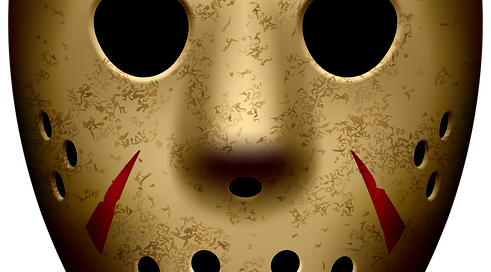Friday the 13th: Freddy and Jason Make Shabbos
Why is Friday the 13th considered so unlucky? For Jews, no worries!
The new year is barely a few days old and already we are forced to confront a Friday the 13th. This year we’ll have two (October is the other) so conventional wisdom might suggest that 2023 is especially unlucky. Or is it? Why must we treat this confluence of day and date as our worst nightmare? For Jews, nothing could be more promising than the combination of a Friday and the number 13.
Just look at the “Friday the 13th” movies and how many Jewish values they espouse. Everyone goes to camp and sits around the campfire. The hockey mask is a nice touch for Purim. OK, so there’s a little blood, but I was at a bris last week, so I can take it. Blood happens.
For Jews, no day brings a greater sense of anticipation than Shabbat, which begins each Friday just before sunset. And 13 is a very lucky number – ask any Bar or Bat Mitzvah student (some girls become Bat Mitzvah at 12, but 13 is the magical number most associated with this coming of age spectacle).
Several years ago, a now defunct website of an Israeli flower distributor presented a list of reasons why 13 is so lucky. No doubt Friday the 13th it is a lucky day for flower shops because Israelis buy lots of flowers every Friday - and presumably even more on a Friday that, for some, augurs bad karma.
Here is my list, which incorporates that list along with other sources, including another list at Jewish Unpacked.
1. The Bar/Bat Mitzvah is held at age 13.
2. There are 13 months in the Hebrew lunar calendar (in a leap year).
3. The Bible lists 13 attributes of God’s mercy.
4. When Israel regained its independence in 1948, the first provisional government was called the Minhelet Ha'Am and it had 13 members (for good luck). More recently, the IDF’s version of the Navy Seals is called Unit Shayetet 13 (שייטת 13). 5. Maimonides formulated his famous 13 principles of faith. 6. Moses De Leon published the Zohar, the great work of Kabbala, in the 13th century. 7. The letter Mem, the 13th letter of the Hebrew alphabet, is the first letter in the word Mashiach (messiah), Mayim (water) and both Moshe and Miryam. It is a life-affirming symbol of maternal love (the Hebrew word for mother is punctuated by a mem). 8. The number of festival days in the Jewish calendar adds up to 13 (depending how you count ‘em). 9. Jacob had 13 children (including Dina, his only girl)
10. Last but certainly not least, There are 613 Mitzvot (commandments) in the Torah.
Rashi, the prominent medieval Jewish commentator, explains those knotted fringes on the tallit (prayer shawl) using Jewish numerology. The word tzitzit (in its Mishnaic spelling) has the value 600. Each tassel has eight threads (when doubled over) and five sets of knots, totaling 13. The sum of all the numbers is 613, traditionally the number of mitzvot in the Torah. The idea is that donning a garment with these fringes reminds its wearer of all Torah commandments.
Also, in Hebrew numerology, the letters in the words Ahava (love) and Echad (One/unity) both add up to 13.
Pretty cool, don’t you think? Jews love 13 so much there was even a Broadway musical made with that title (featuring arguably the coolest rabbi of all time - present company excluded).
So why is the number 13 regarded with such dread by everyone, it seems, except for Jews? There’s even a word for it: Triskaidekaphobia, and causes many people to change their flight plans, skip floors in hotels, call in sick and delay purchases. Henry Ford declined to do business on Friday the 13th (I suspect the notorious antisemite didn’t buy too many flowers for Shabbat that week).
Christian fear of the number thirteen may go back to the Last Supper. Jesus and his apostles numbered thirteen at that meal, and within a day Jesus was crucified. The moral of the story is, if your name is Jesus and you are invited for dinner, never eat at the table with 12 other people.
Some believe the fear of the number 13 goes back to Norse mythology. According to Norse tradition twelve gods were invited to a banquet at Valhalla. Loki, the evil god, wasn't invited to this party but crashed it anyway, bringing the number of guests to thirteen. During the evening, Loki, always looking to cause destruction, shot the god Balder with an arrow, killing a favorite of the gods. As a result of this story, the number thirteen became a source of anxiety for people. By the time Jesus began preaching, the superstition had already been established, but the Last Supper certainly reinforced it.
Some Jews consider the U.S. $1 bill lucky because there are so many 13s on it: 13 stars, 13 stripes, 13 steps, 13 arrows and even an olive branch with 13 leaves on it. That’s a lot of 13s for an American currency, but it seems that the founders were not as paranoid of the number as one might think. Ben Franklin had a list of thirteen virtues that “occurr’d to me as necessary or desirable.”
So no need to fear the number 13 - especially if you are Jewish. And most especially if it’s Friday.
Shabbat shalom!






